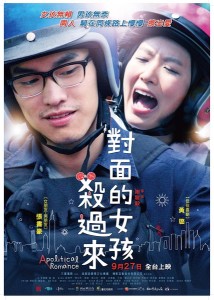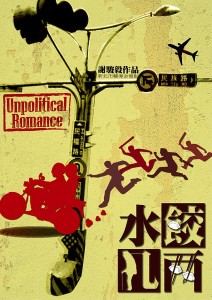Unpolitical Romance
水饺几两
Taiwan, 2012, colour, 1.85:1, 88 mins.
Director: Xie Junyi 谢骏毅.
Rating: 8/10.
Cross-straits rom-com, set in Taiwan, has an easy rhythm and great lead chemistry.
Taibei, the present day, late March. An employee at the Taipei Department of Civil Affairs, Chen Yuzheng (Zhang Shuhao), 28, is reprimanded by his boss, Xu Ziqiang (Wang Ziqiang) for his sloppy work on writing a Taiwan-China Cross-Cultural Etiquette Manual without knowing anyone from the Mainland or ever having been to China. Chen Yuzheng is given a week to revise what is already his 10th draft. That evening, while having dinner at a dumplings street-stall, he gets talking to a young woman from Beijing, Qin Lang (Huang Lu), when he intervenes in an argument she’s having with the stall-owner (Lv Xuefeng). Qin Lang, 25, has just arrived from Beijing on a mission to track down Chen Guang, the childhood first love of her 79-year-old grandmother, Li Huan (Zhang Liqiu), with whom she is very close: Li Huan and Chen Guang last saw each other in Mianyang, Sichuan province, in 1948, before they were separated by the civil war and Chen Guang moved to Taiwan. Chen Yuzheng proposes a deal to Qin Lang: he will help her find Chen Guang if she helps him rewrite his manual. Qin Lang, who has no address or phone number for Chen Guang, grudgingly agrees and ends up staying at Chen Yuzheng’s flat. At the Veterans’ Association, Chen Yuzheng manages to get a list of potential candidates, which they then narrow down to six names. As they travel around Taiwan together, meeting people on the list, the bossy Qin Lang gradually warms to the boyish Chen Yuzheng, and both open up to each other.
REVIEW
A Mainland-Taiwan cross-cultural rom-com that hardly puts a foot wrong, Unpolitical Romance 水饺几两 is basically the reverse of Great Wall My Love 追爱 (2011), with a Mainland girl in this case visiting Taiwan and getting involved with a local guy who helps her track down her grandmother’s first love from 60-odd years ago. As in the delightful movie by Liu Yiming 刘怡明 [Emily Liu] – where a Taiwan girl goes to China with her father and ends up trying to find a first love from his youth – the plot is basically just a device to hook an odd-couple relationships story onto. Romance has a much simpler structure than Great Wall, keeping its focus more tightly on the central couple, and ultimately bests it by a short head thanks to the excellent, unforced chemistry between its leads, Mainland actress Huang Lu 黄璐 (who also executive produced) and Taiwan actor Zhang Shuhao 张书豪.
Despite its English title, politics are never far below the surface in Unpolitical Romance, though always in a light, easy way. Huang’s feisty, argumentative Mainlander (with the actress turning on a broad Beijing accent) contrasts notably with Zhang’s softer, almost boyish Taiwanese, who throws a tantrum when she criticises his collection of robot toys. She’s constantly referring to Taiwan as a “province” rather than a country, and in one remarkable scene, set at Taipei’s holy-of-holies National Chiang Kai-shek Hemorial Hall, jokingly starts singing a Communist anthem. In return, he tries to teach her some Taiwanese (Hokkien) dialect, and introduce her to local food. As the barriers start to fall, and she mellows, the rom side of the com starts to click in emotionally around the hour mark, with an airport finale that teases the audience whether the two representatives of Greater China territories will “unify” their relationship.
Simply by being set on tiny Taiwan rather than in China’s vaster, more photogenic landscapes, Romance has a more localised, intimate feel than Liu’s Great Wall, though that does help to throw the spotlight more on the central relationship. Sichuan-born Huang is an actress who has consistently made interesting, non-mainstream choices throughout her career (Blind Mountain 盲山, 2007; The Red Awn 红色康拜因, 2007) even when the films themselves have been less interesting (She, a Chinese 中国姑娘, 2009; Here There 这里 那里, 2011), and here she dominates the movie with a showy but believable portrait of a brash, apparently self-confident Mainlander who’s the exact opposite of Zhang’s emotionally under-developed Taiwan guy. Zhang (One Day 有一天, 2009; Kora 转山, 2011) comes through in a quieter way as the film progresses and Huang’s role mellows, and his character’s seeming inability to commit emotionally underscores later scenes like his reunion with his father and the airport finale. There’s nothing especially original in the character set-up but it’s consistently engaging.
With its tight, 88-minute running time, the film manages a good balance between the central relationship, the personal stories of people they meet en route (all of which reflect in some way on the geographical split between those who stayed in China post-1949 and those who fled to Taiwan), and the touristy aspects as they travel round the island’s communities. Both, it emerges, are orphans in a way: she was effectively raised by her grandmother, and he has been alienated from his criminal father for some time. These details emerge naturally from the script, which has an easy rhythm and unforced pace.
First-time feature director Xie Junyi 谢骏毅, a graduate of New York University Tisch School of the Arts Asia programme, plays down the Taiwan-cute potential of the relationship, and even finds some time to satirise it gently in the dialogue, though a few moments do slip through (such as a brief animated section) that mark the film as essentially from Taiwan. Photography by Brooklyn-born d.p.-filmmaker Jordan Schiele 熙氻 (also from the Tisch Asia programme, and who previously worked with Huang on his  Shanghai-set short, Ten Years from Now 十年后, 2011) is natural and unfussy without a specific “look” that gets in the way of the performances.
Shanghai-set short, Ten Years from Now 十年后, 2011) is natural and unfussy without a specific “look” that gets in the way of the performances.
The Chinese title roughly means “Several Ounces of Boiled Dumplings”, referring to the scene where the two leads first meet and the presence of the dish elsewhere in the movie. Reflecting the Mainland element, the film’s main title artwork actually uses the simplified version (几) of one character, rather than the traditional version (幾) used on Taiwan. By the time the film was released in Taiwan its English and Chinese titles had been changed to Apolitical Romance (but with colour used in a way that it could be read as A Political Romance) and 对面的女孩杀过来 (literally, “The Girl Opposite Storms Over”).
CREDITS
Presented by Sanxi Film (TW).
Script: Fu Kailing, Xie Junyi, Zhu Yi. Original story: Fu Kailing, Xie Junyi. Script assistance: Gu Qiao, Huang Lu. Photography: Jordan Schiele. Editor: Yang Weixin. Music: Xu Weishan. Song vocal: Huang Lu. Art direction: Lin Peichen. Costumes: Lin Zhongmin. Sound: Sun Wenyi. Additional photography: Feng Baijin (Beijing). Animation: Pan Xinbing. Artistic direction: Zhou Chunya.
Cast: Zhang Shuhao (Chen Yuzheng), Huang Lu (Qin Lang), Chen Wenbin (Chen Yuzheng’s father), Zhang Liqiu (Li Huan, Qin Lang’s grandmother), Qian Demen (Chen Guang no. 4), Zhang Han (Yang Zhanyu, Qin Lang’s ex-boyfriend), Ke Huanru (Yang Zhanyu’s wife), Wang Juan (Chen Guang no. 3’s wife), Kang Kang (shrimp-soup restaurant owner), Luo Bei’an (gangster boss), Lv Xuefeng (dumpling-stall owner), Zhang Shiying (fake hotel receptionist), Huang Huaichen (Weng, Chen Guang no. 2’s grandson), Wu Yaxin (Yufen), Yan Dingsheng (Xiaoheng), Zhang Caixing (De), Wang Ziqiang (Xu Ziqiang, Yucheng’s boss), Wang Zhiming (Chen Guang no. 1), Qiu Qiuju (Chen Guang no. 2’s wife), Wu Yuansheng (Chen Guang no. 3).
Premiere: Taipei Golden Horse Film Festival (Made in Taiwan), 10 Nov 2012.
Release: Taiwan, 27 Sep 2013.
(Review originally published on Film Business Asia, 26 Mar 2013.)
